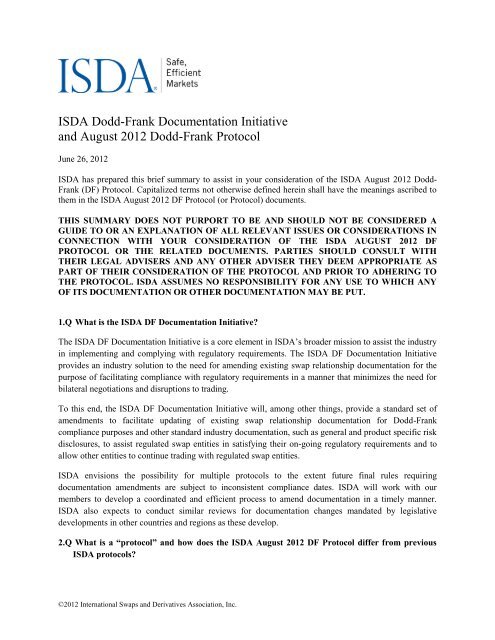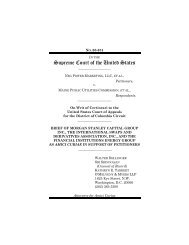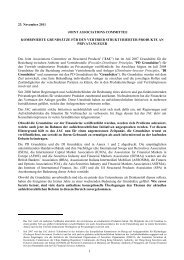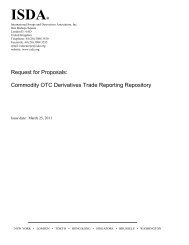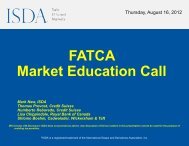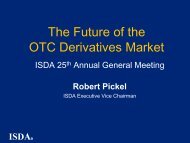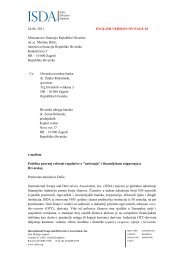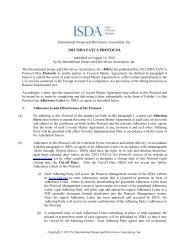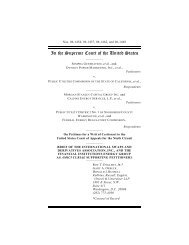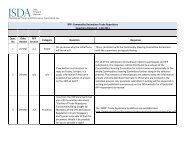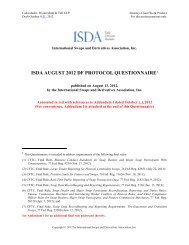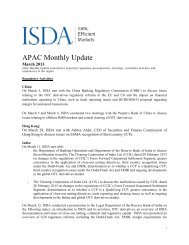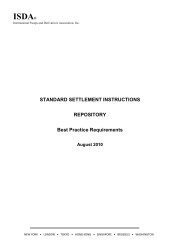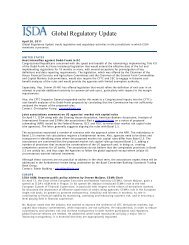Summary of the Dodd-Frank Documentation Initiative and - ISDA
Summary of the Dodd-Frank Documentation Initiative and - ISDA
Summary of the Dodd-Frank Documentation Initiative and - ISDA
You also want an ePaper? Increase the reach of your titles
YUMPU automatically turns print PDFs into web optimized ePapers that Google loves.
<strong>ISDA</strong> <strong>Dodd</strong>-<strong>Frank</strong> <strong>Documentation</strong> <strong>Initiative</strong><br />
<strong>and</strong> August 2012 <strong>Dodd</strong>-<strong>Frank</strong> Protocol<br />
June 26, 2012<br />
<strong>ISDA</strong> has prepared this brief summary to assist in your consideration <strong>of</strong> <strong>the</strong> <strong>ISDA</strong> August 2012 <strong>Dodd</strong>-<br />
<strong>Frank</strong> (DF) Protocol. Capitalized terms not o<strong>the</strong>rwise defined herein shall have <strong>the</strong> meanings ascribed to<br />
<strong>the</strong>m in <strong>the</strong> <strong>ISDA</strong> August 2012 DF Protocol (or Protocol) documents.<br />
THIS SUMMARY DOES NOT PURPORT TO BE AND SHOULD NOT BE CONSIDERED A<br />
GUIDE TO OR AN EXPLANATION OF ALL RELEVANT ISSUES OR CONSIDERATIONS IN<br />
CONNECTION WITH YOUR CONSIDERATION OF THE <strong>ISDA</strong> AUGUST 2012 DF<br />
PROTOCOL OR THE RELATED DOCUMENTS. PARTIES SHOULD CONSULT WITH<br />
THEIR LEGAL ADVISERS AND ANY OTHER ADVISER THEY DEEM APPROPRIATE AS<br />
PART OF THEIR CONSIDERATION OF THE PROTOCOL AND PRIOR TO ADHERING TO<br />
THE PROTOCOL. <strong>ISDA</strong> ASSUMES NO RESPONSIBILITY FOR ANY USE TO WHICH ANY<br />
OF ITS DOCUMENTATION OR OTHER DOCUMENTATION MAY BE PUT.<br />
1.Q What is <strong>the</strong> <strong>ISDA</strong> DF <strong>Documentation</strong> <strong>Initiative</strong>?<br />
The <strong>ISDA</strong> DF <strong>Documentation</strong> <strong>Initiative</strong> is a core element in <strong>ISDA</strong>’s broader mission to assist <strong>the</strong> industry<br />
in implementing <strong>and</strong> complying with regulatory requirements. The <strong>ISDA</strong> DF <strong>Documentation</strong> <strong>Initiative</strong><br />
provides an industry solution to <strong>the</strong> need for amending existing swap relationship documentation for <strong>the</strong><br />
purpose <strong>of</strong> facilitating compliance with regulatory requirements in a manner that minimizes <strong>the</strong> need for<br />
bilateral negotiations <strong>and</strong> disruptions to trading.<br />
To this end, <strong>the</strong> <strong>ISDA</strong> DF <strong>Documentation</strong> <strong>Initiative</strong> will, among o<strong>the</strong>r things, provide a st<strong>and</strong>ard set <strong>of</strong><br />
amendments to facilitate updating <strong>of</strong> existing swap relationship documentation for <strong>Dodd</strong>-<strong>Frank</strong><br />
compliance purposes <strong>and</strong> o<strong>the</strong>r st<strong>and</strong>ard industry documentation, such as general <strong>and</strong> product specific risk<br />
disclosures, to assist regulated swap entities in satisfying <strong>the</strong>ir on-going regulatory requirements <strong>and</strong> to<br />
allow o<strong>the</strong>r entities to continue trading with regulated swap entities.<br />
<strong>ISDA</strong> envisions <strong>the</strong> possibility for multiple protocols to <strong>the</strong> extent future final rules requiring<br />
documentation amendments are subject to inconsistent compliance dates. <strong>ISDA</strong> will work with our<br />
members to develop a coordinated <strong>and</strong> efficient process to amend documentation in a timely manner.<br />
<strong>ISDA</strong> also expects to conduct similar reviews for documentation changes m<strong>and</strong>ated by legislative<br />
developments in o<strong>the</strong>r countries <strong>and</strong> regions as <strong>the</strong>se develop.<br />
2.Q What is a “protocol” <strong>and</strong> how does <strong>the</strong> <strong>ISDA</strong> August 2012 DF Protocol differ from previous<br />
<strong>ISDA</strong> protocols?<br />
©2012 International Swaps <strong>and</strong> Derivatives Association, Inc.
The protocol is a multilateral contractual amendment mechanism that allows for various st<strong>and</strong>ardized<br />
amendments to be deemed to be made to <strong>the</strong> relevant Protocol Covered Agreements between any two<br />
adhering parties. It builds on <strong>the</strong> principle that parties may agree with one or more o<strong>the</strong>r parties that<br />
certain terms <strong>and</strong> provisions will apply to <strong>the</strong>ir respective relationships (unless <strong>and</strong> until <strong>the</strong>y specifically<br />
agree o<strong>the</strong>rwise).<br />
Market participants indicate <strong>the</strong>ir participation in <strong>the</strong> protocol arrangement by following <strong>the</strong> adherence<br />
instructions posted on <strong>the</strong> <strong>ISDA</strong> website (www.isda.org), which includes submission <strong>of</strong> a letter (an<br />
"Adherence Letter") <strong>and</strong> payment <strong>of</strong> an adherence fee <strong>of</strong> US $500.00. Each party submitting a letter <strong>and</strong><br />
paying <strong>the</strong> adherence fee is an “Adhering Party.” Additionally, Adhering Parties will be required to<br />
specify how <strong>the</strong>y will receive Protocol Questionnaires from o<strong>the</strong>r Adhering Parties in <strong>the</strong> Adherence<br />
Letter.<br />
Unlike with previous <strong>ISDA</strong> protocols where amendments were effected solely with delivery <strong>of</strong> an<br />
adherence letter by each party to <strong>the</strong> underlying document to be amended (i.e., a master agreement), this<br />
protocol will include additional bilateral delivery requirements in order to effectuate <strong>the</strong> amendments (see<br />
5.Q below for more information related to <strong>the</strong> delivery requirements). Each party that submits an<br />
Adherence Letter must also deliver a completed Protocol Questionnaire to each relevant counterparty for<br />
<strong>the</strong> amendments to be effective. As a result <strong>of</strong> <strong>the</strong>se additional bilateral delivery requirements, <strong>ISDA</strong><br />
toge<strong>the</strong>r with Markit have developed a technology-based solution (“<strong>ISDA</strong>/Markit platform”) to automate<br />
<strong>the</strong> information-ga<strong>the</strong>ring process <strong>and</strong> provide sharing <strong>of</strong> submitted data <strong>and</strong> documents to permissioned<br />
counterparties (see 6.Q below for more information).<br />
The <strong>ISDA</strong> August 2012 DF Protocol is designed to provide an efficient means for swap dealers <strong>and</strong><br />
counterparties to amend Protocol Covered Agreements through <strong>the</strong> exchange <strong>of</strong> Protocol Questionnaires.<br />
So that a counterparty will know when it is completing its Protocol Questionnaire whe<strong>the</strong>r a particular<br />
dealer is participating in <strong>the</strong> Protocol (<strong>and</strong> by what means it may deliver <strong>the</strong> Protocol Questionnaire to <strong>the</strong><br />
dealer), it is recommended that swap dealers submit <strong>the</strong>ir Adherence Letters early in <strong>the</strong> adherence<br />
period.<br />
3.Q What is <strong>the</strong> <strong>ISDA</strong> August 2012 DF Protocol?<br />
The <strong>ISDA</strong> August 2012 DF Protocol is intended to address <strong>the</strong> requirements <strong>of</strong> <strong>the</strong> following final rules<br />
(“Covered Rules”):<br />
CFTC, Final Rule, Business Conduct St<strong>and</strong>ards for Swap Dealers <strong>and</strong> Major Swap Participants,<br />
77 Fed. Reg. 9734 (Feb. 17, 2012);<br />
CFTC, Final Rule, Large Trader Reporting for Physical Commodity Swaps, 76 Fed. Reg. 43851<br />
(July 22, 2011);<br />
CFTC, Final Rule, Position Limits for Futures <strong>and</strong> Swaps, 76 Fed. Reg. 71626 (Nov. 18, 2011);<br />
CFTC, Final Rule, Real-Time Public Reporting <strong>of</strong> Swap Transaction Data, 77 Fed. Reg. 1182<br />
(Jan. 9, 2012);<br />
CFTC, Final Rule, Swap Data Recordkeeping <strong>and</strong> Reporting Requirements, 77 Fed. Reg. 2136<br />
(Jan. 13, 2012); <strong>and</strong><br />
<strong>ISDA</strong> D/F <strong>Documentation</strong> <strong>Initiative</strong> <strong>and</strong> <strong>ISDA</strong> August 2012 DF Protocol June 26, 2012<br />
2
CFTC, Final Rule, Swap Dealer <strong>and</strong> Major Swap Participant Recordkeeping <strong>and</strong> Reporting,<br />
Duties, <strong>and</strong> Conflicts <strong>of</strong> Interest Policies <strong>and</strong> Procedures; Futures Commission Merchant <strong>and</strong><br />
Introducing Broker Conflicts <strong>of</strong> Interest Policies <strong>and</strong> Procedures; Swap Dealer, Major Swap<br />
Participant, <strong>and</strong> Futures Commission Merchant Chief Compliance Officer, 77 Fed. Reg. 20128<br />
(Apr. 3, 2012).<br />
4.Q What agreements will <strong>the</strong> <strong>ISDA</strong> August 2012 DF Protocol cover?<br />
The Protocol is designed to supplement existing master agreements under which parties may execute<br />
“swaps.” The Protocol adds notices, representations <strong>and</strong> covenants responsive to <strong>Dodd</strong>-<strong>Frank</strong> Title VII<br />
requirements that must satisfied at or prior to <strong>the</strong> time that swap transactions are <strong>of</strong>fered <strong>and</strong> executed.<br />
The Protocol is not limited to <strong>ISDA</strong> Master Agreements, <strong>and</strong> may be used to amend all agreements<br />
between a pair <strong>of</strong> parties pursuant to which <strong>the</strong>y enter into swaps. See below regarding <strong>the</strong> process<br />
required for any pair <strong>of</strong> parties to amend <strong>the</strong>ir existing master agreement through use <strong>of</strong> <strong>the</strong> Protocol.<br />
5.Q How is <strong>the</strong> <strong>ISDA</strong> August 2012 DF Protocol structured? What is <strong>the</strong> purpose <strong>of</strong> <strong>the</strong> different<br />
Protocol documents?<br />
In order to comply with rules adopted by <strong>the</strong> CFTC under Title VII <strong>of</strong> <strong>Dodd</strong>-<strong>Frank</strong>, swap dealers must<br />
obtain certain “know your counterparty” information from counterparties <strong>and</strong> also verify that<br />
counterparties qualify as “eligible contract participants” (which requires <strong>the</strong> counterparty to identify <strong>the</strong><br />
particular prong <strong>of</strong> <strong>the</strong> ECP definition that applies when <strong>the</strong> swap dealer is relying on a representation<br />
from <strong>the</strong> counterparty). In addition, <strong>the</strong> particular notices <strong>and</strong> supplemental terms that are required to<br />
establish compliance depend on <strong>the</strong> legal status <strong>of</strong> <strong>the</strong> counterparty (e.g., Swap Dealer, MSP, special<br />
entity, etc.) <strong>and</strong> <strong>the</strong> “know your counterparty” rules require swap dealers to be aware <strong>of</strong> <strong>the</strong>se legal<br />
statuses. Therefore, a protocol intended to establish documentation compliance needs to include delivery<br />
<strong>of</strong> <strong>the</strong> relevant information by both swap dealers <strong>and</strong> <strong>the</strong>ir counterparties in order to satisfy <strong>the</strong>se<br />
requirements <strong>and</strong> establish that <strong>the</strong> parties are entering into <strong>the</strong> proper supplemental terms.<br />
Concerns arose, however, that some <strong>of</strong> <strong>the</strong> data required for delivery may be considered sensitive.<br />
Therefore, market participants may be deterred from adhering to a protocol that required dissemination <strong>of</strong><br />
this information to parties o<strong>the</strong>r than <strong>the</strong>ir counterparties. Additionally, some provisions would be<br />
required to be elective, <strong>and</strong> in some cases, parties (particularly special entities) may need to differentiate<br />
elections for different counterparties.<br />
Accordingly, <strong>ISDA</strong> developed an approach to architecture <strong>and</strong> process designed to accommodate two<br />
fundamental objectives: Selective access to information (i.e., who is given permission to see certain<br />
information) <strong>and</strong> variation in <strong>the</strong> document provisions to which a party is bound (ei<strong>the</strong>r because <strong>of</strong> <strong>the</strong><br />
type <strong>of</strong> counterparty or because <strong>the</strong> provisions are optional). The process as developed is necessarily more<br />
complex than multilateral amendments that have been accomplished via past <strong>ISDA</strong> protocols. However,<br />
we believe it will reduce <strong>the</strong> need to amend documents outside <strong>of</strong> <strong>the</strong> protocol process <strong>and</strong> also provides<br />
sufficient flexibility to accommodate additional information delivery <strong>and</strong> variation in <strong>the</strong> document<br />
provisions to which a party is bound that may arise as additional rules are finalized.<br />
<strong>ISDA</strong> D/F <strong>Documentation</strong> <strong>Initiative</strong> <strong>and</strong> <strong>ISDA</strong> August 2012 DF Protocol June 26, 2012<br />
3
The architecture consists <strong>of</strong> four documents, each as described below: (I) <strong>the</strong> DF Supplement, (II) <strong>the</strong><br />
Protocol, (III) an Adherence Letter, <strong>and</strong> (IV) <strong>the</strong> Protocol Questionnaire.<br />
I. DF Supplement<br />
a. The DF Supplement sets forth certain st<strong>and</strong>ardized representations <strong>and</strong> covenants relating to<br />
<strong>the</strong> Covered Rules.<br />
i. Representations <strong>and</strong> covenants are set forth in various “Schedules.”<br />
ii. All Adhering Parties will be deemed to incorporate Schedule 2. However, certain<br />
sections <strong>of</strong> Schedule 2 are only applicable to certain types <strong>of</strong> counterparty pairs based<br />
on representations <strong>the</strong>y have made to each o<strong>the</strong>r regarding <strong>the</strong>ir legal status.<br />
iii. Schedules 3-6 are optional <strong>and</strong> applicable only if both parties in a pair elect to apply<br />
<strong>the</strong>m.<br />
iv. Counterparties may agree to incorporate specific elective Schedules <strong>of</strong> <strong>the</strong> DF<br />
Supplement into Protocol Covered Agreements by adhering to <strong>the</strong> Protocol as<br />
described below.<br />
II. Protocol<br />
a. Under <strong>the</strong> <strong>ISDA</strong> August 2012 DF Protocol, each PCA Principal participating in <strong>the</strong> Protocol<br />
directly or through a PCA Agent who has executed an Adherence Letter <strong>and</strong> delivered<br />
Protocol Questionnaires on its behalf agrees that <strong>the</strong> particular Schedules <strong>of</strong> <strong>the</strong> DF<br />
Supplement to which it <strong>and</strong> a “Matched PCA Principal” (as defined below) have mutually<br />
agreed will operate as a supplement to all Protocol Covered Agreements governing swaps<br />
between <strong>the</strong>m.<br />
b. The particular Schedules <strong>of</strong> <strong>the</strong> DF Supplement to which a PCA Principal agrees will be<br />
specified in its Protocol Questionnaire.<br />
c. Each PCA Principal <strong>and</strong> PCA Agent directly participating in <strong>the</strong> Protocol through execution<br />
<strong>of</strong> an Adherence Letter is provided <strong>the</strong> ability to amend Protocol Covered Agreements by<br />
completing one or more Protocol Questionnaires <strong>and</strong> delivering <strong>the</strong>m in <strong>the</strong> manner described<br />
below.<br />
d. The Protocol also includes provisions designed to work with <strong>the</strong> DF Supplement by<br />
establishing that information delivered by Protocol Questionnaire is considered “DF<br />
Supplement Information” for purposes <strong>of</strong> <strong>the</strong> DF Supplement.<br />
e. A PCA Principal or PCA Agent will bind itself (<strong>and</strong> in <strong>the</strong> case <strong>of</strong> a PCA Agent, its PCA<br />
Principals) to <strong>the</strong> Protocol by delivery <strong>of</strong> an Adherence Letter.<br />
III. Adherence Letter<br />
a. Signed <strong>and</strong> submitted by each party agreeing to <strong>the</strong> terms <strong>of</strong> <strong>the</strong> Protocol (an “Adhering<br />
Party”).<br />
i. Will include name, address, <strong>and</strong> o<strong>the</strong>r non-sensitive information.<br />
ii. Will specify <strong>the</strong> address (electronic or o<strong>the</strong>rwise) <strong>and</strong> means by which <strong>the</strong> Adhering<br />
Party will receive Protocol Questionnaires from o<strong>the</strong>r Adhering Parties.<br />
b. Will be uploaded <strong>and</strong> available for public view, like prior <strong>ISDA</strong> protocol adherence letters.<br />
IV. Protocol Questionnaire<br />
<strong>ISDA</strong> D/F <strong>Documentation</strong> <strong>Initiative</strong> <strong>and</strong> <strong>ISDA</strong> August 2012 DF Protocol June 26, 2012<br />
4
a. Pursuant to <strong>the</strong> Protocol, each Adhering Party will complete <strong>and</strong> deliver a Protocol<br />
Questionnaire with information about itself (<strong>and</strong> in <strong>the</strong> case <strong>of</strong> a PCA Agent, its PCA<br />
Principals).<br />
i. The Protocol Questionnaire will include representations as to <strong>the</strong> legal status <strong>of</strong> <strong>the</strong><br />
relevant PCA Principal(s) (ECP, Swap Dealer, MSP, Special Entity, etc.).<br />
ii. A PCA Agent (e.g., an investment advisor or ERISA fiduciary) who has an existing<br />
“umbrella” agreement with a swap dealer for multiple underlying clients may<br />
complete <strong>and</strong> deliver a Protocol Questionnaire on behalf <strong>of</strong> all or some <strong>of</strong> such<br />
clients.<br />
b. The Protocol Questionnaire will allow a PCA Principal to identify its relevant regulatory<br />
statuses <strong>and</strong> make various elections under <strong>the</strong> DF Supplement, including <strong>the</strong> particular<br />
Schedules <strong>of</strong> <strong>the</strong> DF Supplement that will supplement its Protocol Covered Agreements.<br />
c. The party completing <strong>the</strong> Protocol Questionnaire (<strong>the</strong> “Delivering Party”) will have <strong>the</strong><br />
ability to deliver or give permission via <strong>the</strong> <strong>ISDA</strong>/Markit platform for <strong>the</strong> Protocol<br />
Questionnaire to be delivered to, <strong>and</strong> only to, Adhering Parties specifically approved by <strong>the</strong><br />
Delivering Party (each, a “Receiving Party”).<br />
i. To enable <strong>the</strong> same Protocol Questionnaire to be delivered to multiple counterparties,<br />
<strong>and</strong> not allow those counterparties to know <strong>the</strong> identity <strong>of</strong> each o<strong>the</strong>r, <strong>the</strong><br />
<strong>ISDA</strong>/Markit platform will provide for <strong>the</strong> automated designation <strong>of</strong> approved<br />
Receiving Parties.<br />
d. To establish an agreement to amend existing Protocol Covered Agreements, each PCA<br />
Principal (acting directly or, in <strong>the</strong> case <strong>of</strong> Protocol Covered Agreements originally executed<br />
by a PCA Agent, through <strong>the</strong> relevant PCA Agent) must be a “Matched PCA Principal.” To<br />
be a Matched PCA Principal, a Protocol Questionnaire with respect to <strong>the</strong> PCA Principal<br />
must be delivered to <strong>the</strong> relevant Receiving Party <strong>and</strong> a Protocol Questionnaire from such<br />
Receiving Party must also be delivered to <strong>the</strong> PCA Principal or its PCA Agent (as relevant).<br />
e. An Adhering Party will be able to complete more than one Protocol Questionnaire, so that it<br />
may deliver different Protocol Questionnaires to different counterparties under <strong>the</strong> Protocol.<br />
f. Pursuant to <strong>the</strong> Protocol, if a Receiving Party agrees to <strong>the</strong> same Schedules as a Delivering<br />
Party, by each completing its own Protocol Questionnaire <strong>and</strong> delivering it <strong>the</strong> o<strong>the</strong>r party by<br />
any mechanism specified by <strong>the</strong> Receiving Party (by <strong>the</strong> <strong>ISDA</strong>/Markit platform or o<strong>the</strong>rwise)<br />
in its Adherence Letter, <strong>the</strong>n <strong>the</strong> provisions <strong>of</strong> <strong>the</strong> Schedules to which <strong>the</strong>y both agree will<br />
operate as a supplement to all Protocol Covered Agreements governing swaps between<br />
Delivering Party <strong>and</strong> Receiving Party.<br />
6.Q What is <strong>the</strong> <strong>ISDA</strong>/Markit platform?<br />
Markit is working with <strong>ISDA</strong> to develop an online questionnaire for all counterparties in <strong>the</strong> over <strong>the</strong><br />
counter (OTC) swaps market. The purpose <strong>of</strong> <strong>the</strong> service is to centralize counterparty categorization<br />
under <strong>Dodd</strong>-<strong>Frank</strong> <strong>and</strong> electronically amend all Protocol Covered Agreements in accordance with <strong>the</strong><br />
Covered Rules by <strong>the</strong> October deadline.<br />
<strong>ISDA</strong> D/F <strong>Documentation</strong> <strong>Initiative</strong> <strong>and</strong> <strong>ISDA</strong> August 2012 DF Protocol June 26, 2012<br />
5
7.Q Will adherence to <strong>the</strong> <strong>ISDA</strong> August 2012 DF Protocol satisfy all regulatory<br />
requirements/obligations in connection with <strong>the</strong> Covered Rules?<br />
The CFTC regulations addressed by this Protocol have far-ranging implications for <strong>the</strong> derivatives<br />
market, including <strong>the</strong> terms under which counterparties are required or wish to transact in OTC<br />
derivatives. While certain <strong>of</strong> <strong>the</strong> regulations (<strong>and</strong> <strong>the</strong> statutory requirements that <strong>the</strong>y implement) impose<br />
specific documentation requirements, o<strong>the</strong>rs impose compliance requirements for swap dealers that can<br />
be met through various combinations <strong>of</strong> documentation <strong>and</strong> internal policies, <strong>and</strong> still o<strong>the</strong>rs are not<br />
susceptible to being addressed through a protocol. The Protocol is designed to provide basic st<strong>and</strong>ardized<br />
provisions to enable market participants to amend <strong>the</strong>ir existing documentation with swap dealers. While<br />
provision <strong>of</strong> such st<strong>and</strong>ardized terms is designed to provide an efficient manner for a large number <strong>of</strong><br />
counterparties to amend <strong>the</strong>ir bilateral contracts to address basic requirements <strong>of</strong> <strong>the</strong> relevant CFTC<br />
regulations, it cannot address all situations, products or types <strong>of</strong> counterparties. Counterparties should<br />
obtain legal advice as to whe<strong>the</strong>r <strong>the</strong> provisions <strong>of</strong> <strong>the</strong> Protocol address <strong>the</strong>ir particular situation.<br />
8.Q What is <strong>the</strong> purpose <strong>of</strong>, <strong>and</strong> rationale for, DF Supplement Section 2.2?<br />
Under <strong>the</strong> Protocol, parties may agree to make representations, agree to covenants <strong>and</strong> provide<br />
information to establish compliance with various provisions <strong>of</strong> <strong>the</strong> Covered Rules <strong>and</strong> apply elective safe<br />
harbors. The focus <strong>of</strong> <strong>the</strong> Protocol is on giving parties an efficient <strong>and</strong> st<strong>and</strong>ardized manner to satisfy<br />
new compliance requirements, not on creating additional (<strong>and</strong> potentially unanticipated) contractual<br />
remedies under existing bilateral contracts. Fur<strong>the</strong>r, in some cases, <strong>the</strong> information provided under <strong>the</strong><br />
Protocol is similar in kind to information currently provided by customers as part <strong>of</strong> a dealer’s “onboarding”<br />
process, which typically does not give rise to termination rights under a master agreement.<br />
However, a party providing representations <strong>and</strong> information under <strong>the</strong> Protocol should note that <strong>the</strong> o<strong>the</strong>r<br />
party will rely upon <strong>the</strong>m <strong>and</strong> may have o<strong>the</strong>r remedies available to it under law or contract (including<br />
<strong>the</strong>ir master agreement to <strong>the</strong> extent covered by provisions outside <strong>of</strong> <strong>the</strong> Protocol).<br />
9.Q Is DF Supplement Section 2.6 consent language sufficient to establish a valid consent to <strong>the</strong><br />
disclosure <strong>of</strong> confidential information in all jurisdictions?<br />
Under <strong>the</strong> Covered Rules, swap dealers will be required to report certain information about swaps to swap<br />
data repositories, who may disseminate that information publicly. Because <strong>the</strong> swap dealer may be<br />
subject to contractual limits on such disclosure, <strong>the</strong> Protocol contains a provision whereby <strong>the</strong> nonreporting<br />
counterparty consents to such disclosure. However, this consent may not be sufficient to<br />
establish a valid consent to <strong>the</strong> disclosure <strong>of</strong> confidential information in certain jurisdictions. On a caseby-case<br />
basis, parties will need to determine whe<strong>the</strong>r or not <strong>the</strong> jurisdiction <strong>of</strong> ei<strong>the</strong>r party has a<br />
heightened consent requirement that would not be satisfied by <strong>the</strong> consent set forth in <strong>the</strong> Protocol.<br />
Satisfaction <strong>of</strong> any such heightened consent requirement will have to be documented on a bilateral basis.<br />
10.Q How do DF Supplement Sections 2.13 <strong>and</strong> 2.14 address use <strong>and</strong> disclosure <strong>of</strong> “material<br />
confidential information?”<br />
The external business conduct rules establish a new regulatory st<strong>and</strong>ard governing <strong>the</strong> use <strong>and</strong> disclosure<br />
<strong>of</strong> “material confidential information” provided by a counterparty to a swap dealer, subject to a<br />
<strong>ISDA</strong> D/F <strong>Documentation</strong> <strong>Initiative</strong> <strong>and</strong> <strong>ISDA</strong> August 2012 DF Protocol June 26, 2012<br />
6
qualification explicitly permitting parties to establish an alternative st<strong>and</strong>ard by agreement. Prior to <strong>the</strong><br />
establishment <strong>of</strong> this regulatory st<strong>and</strong>ard, swap counterparties <strong>of</strong>ten addressed similar issues through nondisclosure<br />
agreements. Accordingly, where <strong>the</strong> parties have agreed upon <strong>the</strong> restrictions <strong>and</strong> permitted<br />
uses <strong>of</strong> such information by a prior agreement, <strong>the</strong> Protocol defers to such an agreement. As past<br />
agreements were not drafted to satisfy <strong>the</strong> external business conduct rules’ requirements for establishing<br />
permissible uses <strong>of</strong> material confidential information, Section 2.13 “brings down” those agreements into<br />
<strong>the</strong> new regulatory environment by providing that information that is within <strong>the</strong> scope <strong>of</strong> <strong>the</strong> original<br />
agreement remains subject to <strong>the</strong> terms <strong>of</strong> <strong>the</strong> that agreement as read in <strong>the</strong> legal context in which it was<br />
negotiated.<br />
To <strong>the</strong> extent that any material confidential information is not within <strong>the</strong> scope <strong>of</strong> a pre-existing<br />
agreement between <strong>the</strong> parties (or if no such agreement exists), Section 2.14 establishes an agreement <strong>of</strong><br />
<strong>the</strong> parties regarding <strong>the</strong> restrictions <strong>and</strong> permitted uses <strong>of</strong> such information within <strong>the</strong> context <strong>of</strong> <strong>the</strong> new<br />
regulatory st<strong>and</strong>ard.<br />
11.Q What do DF Supplement Schedules 3 – 6 cover?<br />
The external business conduct rules impose upon swap dealers a duty to reasonably determine <strong>the</strong><br />
suitability <strong>of</strong> any swap “recommended” to a counterparty <strong>and</strong> impose heightened suitability or “best<br />
interest” duties when a swap dealer recommends a tailored swap to a “special entity.” However, <strong>the</strong> rules<br />
provide safe harbors from this requirement where <strong>the</strong> counterparty is adequately advised <strong>and</strong> will exercise<br />
independent judgment in assessing swap recommendations. These safe harbors can be satisfied in whole<br />
or part through representations <strong>of</strong> <strong>the</strong> counterparty <strong>and</strong> relevant advisers. Each swap dealer <strong>and</strong><br />
counterparty must determine for itself whe<strong>the</strong>r, <strong>and</strong> how, it wishes to satisfy <strong>the</strong> criteria <strong>of</strong> <strong>the</strong> safe<br />
harbors.<br />
The Protocol provides a st<strong>and</strong>ardized approach to <strong>the</strong> safe harbors designed to allow counterparties that<br />
are able to make a full set <strong>of</strong> representations required to establish <strong>the</strong> applicability <strong>of</strong> a safe harbor to do<br />
so. Application <strong>of</strong> <strong>the</strong> safe harbors is entirely elective <strong>and</strong> both counterparties to a covered agreement<br />
must agree to a safe harbor in <strong>the</strong>ir Protocol Questionnaire in order for <strong>the</strong> relevant Schedule to be<br />
integrated into <strong>the</strong>ir agreements. Partial solutions to safe harbors are not provided, because such partial<br />
solutions would not eliminate <strong>the</strong> need <strong>of</strong> <strong>the</strong> parties to agree on a bilateral basis as to whe<strong>the</strong>r <strong>the</strong>y will<br />
transact within a safe harbor <strong>and</strong> how its applicability will be established.<br />
The general safe harbor for institutional suitability (Schedule 3) is available to swap dealers <strong>and</strong> all<br />
counterparties that are not regulated swap entities, o<strong>the</strong>r than special entities. The Schedule 4 safe harbor<br />
is for use by swap dealers <strong>and</strong> counterparties that are governmental special entities. This Schedule is<br />
designed to establish both that <strong>the</strong> governmental special entity has a “qualified independent<br />
representative” (necessary for trading with such a special entity in general) <strong>and</strong> to establish that <strong>the</strong> parties<br />
may transact within <strong>the</strong> limited safe harbor that is available for such special entities. Use <strong>of</strong> this Schedule<br />
by a governmental special entity requires a qualified independent representative for <strong>the</strong> governmental<br />
special entity make specified representations <strong>and</strong> covenants.<br />
In <strong>the</strong> case <strong>of</strong> ERISA special entities, two alternative safe harbors (Schedules 5 <strong>and</strong> 6) are available.<br />
ERISA special entities may elect one or both safe harbors (provided <strong>the</strong> corresponding swap dealer has<br />
<strong>ISDA</strong> D/F <strong>Documentation</strong> <strong>Initiative</strong> <strong>and</strong> <strong>ISDA</strong> August 2012 DF Protocol June 26, 2012<br />
7
also agreed to apply ei<strong>the</strong>r or both safe harbors). The first safe harbor (Schedule 5) provides<br />
representations designed to satisfy <strong>the</strong> terms <strong>of</strong> <strong>the</strong> special safe harbor provided exclusively for ERISA<br />
special entities. The second safe harbor (Schedule 6) is a version <strong>of</strong> <strong>the</strong> general safe harbor for special<br />
entities with certain terms modified for ERISA plans. Both require a fiduciary <strong>of</strong> <strong>the</strong> ERISA plan to<br />
agree to certain representations <strong>and</strong> covenants. ERISA special entities should note that <strong>the</strong> second safe<br />
harbor is more limited than <strong>the</strong> first safe harbor in that it does not cover situations in which a swap dealer<br />
has communicated an “opinion” to <strong>the</strong> special entity regarding <strong>the</strong> advisability <strong>of</strong> entering into a swap<br />
transaction. As a consequence, communications with a swap dealer are likely to be more restricted for<br />
ERISA special entities that elect <strong>the</strong> second safe harbor.<br />
DF Protocol participants wishing to use one or more <strong>of</strong> <strong>the</strong> available safe harbor Schedules should note<br />
that <strong>the</strong> representations in <strong>the</strong> Schedules (o<strong>the</strong>r than Schedule 5) require <strong>the</strong> counterparty to a swap dealer<br />
to represent that it is complying with certain written policies <strong>and</strong> procedures. As <strong>the</strong> requirement for<br />
<strong>the</strong>se policies <strong>and</strong> procedures is new, many potential participants may need to create new written policies<br />
<strong>and</strong> procedures before entering into <strong>the</strong> DF Protocol in order to be able to use <strong>the</strong> safe harbors.<br />
12.Q The Protocol Questionnaire requires a Protocol participant to provide information about<br />
certain advisory agents <strong>and</strong> persons who exercise control over <strong>the</strong> respondent’s swap trading.<br />
Some <strong>of</strong> <strong>the</strong>se persons (e.g., a “Designated Evaluation Agent,” “Designated QIR” or<br />
“Designated Fiduciary”) are required to make representations in <strong>the</strong> elective Schedules <strong>of</strong> <strong>the</strong><br />
Protocol. If a participant has more than one such person, can it indicate that?<br />
The external business conduct rules require counterparties to swap dealers to provide information about<br />
agents <strong>and</strong> control persons for various regulatory purposes. The Protocol Questionnaire <strong>and</strong> DF<br />
Supplement are designed to directly address each <strong>of</strong> <strong>the</strong>se regulatory requirements. This may lead to<br />
some apparent redundancy in answering questions. For example a respondent’s “Third Party Control<br />
Person” may also be its “Evaluation Agent.” In such cases, <strong>the</strong> Protocol Questionnaire permits <strong>the</strong><br />
respondent to indicate that fact.<br />
At <strong>the</strong> same time, respondents may have multiple agents or control persons who fit a category described<br />
in <strong>the</strong> Questionnaire. In <strong>the</strong> case <strong>of</strong> multiple “Third Party Control Persons,” respondents should identify<br />
each such Third Party Control Person in <strong>the</strong> Protocol Questionnaire (<strong>and</strong> use additional schedules to do so<br />
if additional space is necessary). This information is needed to satisfy a swap dealer’s counterparty<br />
information requirements.<br />
With respect to “Designated Evaluation Agents,” “Designated QIRs,” <strong>and</strong> “Designated Fiduciaries,” <strong>the</strong>se<br />
are persons who are identified for purposes <strong>of</strong> making representations in Schedules 3-6 <strong>of</strong> <strong>the</strong> DF<br />
Supplement relating to voluntary safe harbors. While it is possible that a counterparty to a swap dealer<br />
could have several agents or advisors that assist it in evaluating swaps under a single master agreement, in<br />
such cases, application <strong>of</strong> <strong>the</strong> safe harbors would require trade-by-trade selection <strong>of</strong> <strong>the</strong> appropriate agent<br />
to make <strong>the</strong> necessary representations. For this reason, <strong>the</strong>se situations require bilateral treatment outside<br />
<strong>of</strong> <strong>the</strong> Protocol. Schedules 3-6 can only be used for situations where a swap dealer’s counterparty has a<br />
single “Designated Evaluation Agent,” “Designated QIR” or “Designated Fiduciary” that can make <strong>the</strong><br />
required representations with respect to all swaps under Matched Protocol Covered Agreements between<br />
<strong>the</strong> parties.<br />
<strong>ISDA</strong> D/F <strong>Documentation</strong> <strong>Initiative</strong> <strong>and</strong> <strong>ISDA</strong> August 2012 DF Protocol June 26, 2012<br />
8


